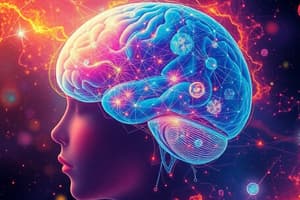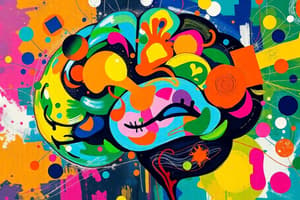Podcast
Questions and Answers
At what age range does the brain's slowing process typically begin?
At what age range does the brain's slowing process typically begin?
The brain's slowing process typically begins in the 30s and 40s.
Which areas of the brain are particularly affected by aging, and what functions are they associated with?
Which areas of the brain are particularly affected by aging, and what functions are they associated with?
The frontal lobe and the hippocampus are particularly affected, associated with memory, emotions, and navigation.
What significant brain activity was observed in a patient just before death?
What significant brain activity was observed in a patient just before death?
A change in a specific band of brain waves involved in high cognitive functions was observed.
What findings have studies suggested about brain activity after death?
What findings have studies suggested about brain activity after death?
How might near-death experiences relate to the brain's function at the moment of death?
How might near-death experiences relate to the brain's function at the moment of death?
What part of the brain matures first in teenagers, and what function does it primarily control?
What part of the brain matures first in teenagers, and what function does it primarily control?
Why might teenagers engage in riskier behaviors according to brain development?
Why might teenagers engage in riskier behaviors according to brain development?
What is neuroplasticity, and how does it affect brain efficiency?
What is neuroplasticity, and how does it affect brain efficiency?
At what age does the brain reach full development?
At what age does the brain reach full development?
How does the development of the ventral striatum compare to the prefrontal cortex in teenagers?
How does the development of the ventral striatum compare to the prefrontal cortex in teenagers?
What role does myelin play in the development of neurons?
What role does myelin play in the development of neurons?
What effect does puberty have on the brain's activity related to self-evaluation?
What effect does puberty have on the brain's activity related to self-evaluation?
How do older adults differ in brain response compared to younger individuals when viewing negative images?
How do older adults differ in brain response compared to younger individuals when viewing negative images?
What significant changes occur in the brain during the ages of 3 to 10?
What significant changes occur in the brain during the ages of 3 to 10?
What changes occur in the amygdala's response to emotional stimuli as people age?
What changes occur in the amygdala's response to emotional stimuli as people age?
Why do children find it easier to learn languages or musical instruments?
Why do children find it easier to learn languages or musical instruments?
What happens to white matter volume as people age?
What happens to white matter volume as people age?
What are some effects of menopause on brain function?
What are some effects of menopause on brain function?
What role does experience play in the brain's plasticity as we age?
What role does experience play in the brain's plasticity as we age?
Flashcards are hidden until you start studying
Study Notes
Teenage Brain Development
- Brain maturation progresses from back to front; the back (motor and sensory areas) develops first.
- Early development of movement skills enables teenagers to quickly learn physical activities like running and jumping.
- Sensory areas mature early, aiding in effective processing of environmental stimuli, such as sights and sounds.
- The frontal lobe, crucial for planning, decision-making, and risk assessment, matures later, leading to increased risk-taking behaviors during adolescence.
- Full brain maturation may extend into early adulthood, approximately around the age of 30.
Brain Growth and Changes
- The brain forms around two weeks after conception, initially developing the neural plate.
- At birth, the brain contains about 100 billion neurons, surpassing the adult count.
- Neurons produce synapses, which are connections for information transfer; the number of synapses increases significantly in early childhood.
- Children’s brains exhibit heightened neuroplasticity, allowing them to learn languages and music more easily due to rapid synaptic formation.
Synaptic Development
- From ages 3 to 10, the brain prunes unnecessary synapses, enhancing efficiency and experience absorption.
- Neuroplasticity allows synapses to be strengthened or weakened based on usage, reflecting the brain's adaptability.
Teenage Emotional and Cognitive Development
- Insulation of neurons continues throughout adolescence, beginning development at the back of the brain and progressing forward.
- Reward-related brain areas, such as the ventral striatum, develop faster than the prefrontal cortex associated with self-control.
- The limbic system undergoes changes, resulting in increased emotional variability and possible risk-taking behaviors.
Post-Puberty Brain Evolution
- After puberty, the brain's prefrontal cortex develops further connections, improving social understanding but also increasing social anxiety susceptibility.
- The brain reaches full development by the 30s, with the highest volume of white matter occurring around age 40.
Aging and Brain Function
- Aging leads to the gradual slowing of brain function beginning in the 30s and 40s, with acceleration noted in the 60s and 70s.
- The outer layer of the brain (cerebral cortex) shrinks, particularly in areas tied to memory and emotions, such as the frontal lobe and hippocampus.
- Older adults typically become more resilient, using both brain hemispheres to engage in short-term memory.
Effects of Menopause on Brain Function
- Hormonal changes during menopause impact brain energy consumption and can lead to mood swings and hot flashes.
- Postmenopausal women demonstrate higher structural connectivity in certain brain regions compared to those who do not undergo menopause.
Brain Activity at Life's End
- Research indicates that brain activity may persist for several minutes after cardiac arrest, potentially allowing the brain to recall significant life events.
- Near-death experiences often include vivid life reviews, suggesting an active cognitive process at the time of dying.
Studying That Suits You
Use AI to generate personalized quizzes and flashcards to suit your learning preferences.




